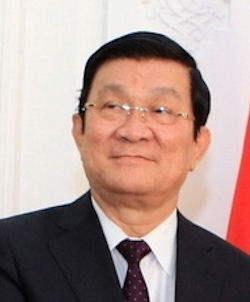Truong Tan Sang
 Truong Tan Sang, Politburo member and standing member of the Secretariat of the Party Central Committee, was elected as Vietnam’s State President with 97.4 percent of votes, at the ongoing first session of the 13th National Assembly in Hanoi on July 25. Holding a university degree in law, Mr. Sang used to be the head of the Central Economic Committee and the secretary of the Ho Chi Minh City Communist Party Committee. Sang replaced Nguyen Minh Triet.
Truong Tan Sang, Politburo member and standing member of the Secretariat of the Party Central Committee, was elected as Vietnam’s State President with 97.4 percent of votes, at the ongoing first session of the 13th National Assembly in Hanoi on July 25. Holding a university degree in law, Mr. Sang used to be the head of the Central Economic Committee and the secretary of the Ho Chi Minh City Communist Party Committee. Sang replaced Nguyen Minh Triet.Truong Tan Sang was born January 20,1949, in My Hanh commune, Duc Hoa district, Long An province. From 1966-1975, he joined the revolution. From 1966 through 1968 he was a leader of the youth-student movement P.K.2, building secret bases among students. He joined the Communist Party 20 December 1969. From 1969 through 1971 he was a Party committee member, Youth Union Secretary, managing a secret armed group of Duc Hoa town (Long An province). He was jailed by the South Vietnamese government in 1971 and detained in the Bien Hoa Prison in Phu Quoc island district until his release under the Paris Peace Treaty in 1973.
From 1973 to April 1975 he was Cadre in charge of organisation work at the T73 Department under the Central Reunification Committee, and from April 1975 to October 1978 he worked at the Gia Dinh Trade Union, deputy head of the Ho Chi Minh City (HCMC) New Economic Zone Development Department, Secretary of the Ho Chi Minh Communist Youth Union in HCM City’s plantations and new economic zones. From 1979 to August 1983 he was a Member of the Party Committee of Binh Chanh district, Ho Chi Minh City, Director of the Pham Van Hai Farm, alternate member of the HCM City Party Committee.
From 1983–86, he headed Ho Chi Minh City Forestry Department, as well as the city's New Economic Zone Development Department. In 1986, he was promoted to the Standing Board of the city's Party Committee. He became a member of the national party's Central Committee in 1991. In 1992, he became chairman for HCMC, the number two position in the city government.
Truong Tan Sang joined the Politburo in 1996 as its 14th ranking member. He was party secretary for HCMC, the top position in the city government, from 1996 to 2000. He was promoted to 10th position in the national party at the Congress in April 2001. He was also appointed head of the Party’s economic commission at this time. In 2003, he was reprimanded for failing to act in the Nam Cam corruption scandal when he headed the city government. Sang was promoted to fifth position in the party at the Congress in April 2006. At this Congress, he was also appointed executive secretary of the party's Secretariat, a position which supervised the membership and the internal structure of the party.
Sang was promoted to the party’s number two slot between congresses in October 2009. His authority soon eclipsed that of General Secretary Nong Duc Manh, the only person nominally above Sang in the party hierarchy. Sang assumed many of Manh's normal responsibilities. At diplomatic meetings, Sang could comment authoritatively, in detail and without notes, whereas Manh appeared disengaged while he read a 30-minute prepared statement verbatim and in a monotone.
One BBC report described rivalry between Sang and Prime Minister Dung and described their relationship as "stormy", but Sang and Dung were pragmatic and market-oriented. Both are southerners, but traditionally the party's top slot has gone to a northerner. Nguyen Phú Trong, a northerner, was appointed general secretary at 11th National Congress held in Hanoi in January 2011. The Congress selected a list of Politburo members, with Sang ranked first on this list. Following the Congress, Trong was named the top ranking member of the party's Secretariat, Vietnam's most powerful decision-making body, while Sang ranked second.
The National Assembly elected Sang as state president on 25 July 2011 with 97.4 percent of the vote. The term of office is five years. Under party regulations, the president is under the authority of Secretariat, so the position is largely ceremonial. Sang's authority derives from his position as the senior member of the Politburo and as the second ranking member of the Secretariat. Sang told the Assembly that he would defend Vietnam’s independence and territorial integrity, and would resolve the East Sea dispute with China peacefully. Sang told the Assembly that as president, he would work to set a foundation that will allow Vietnam to be become an industrialized and modernized country by 2020.
|
NEWSLETTER
|
| Join the GlobalSecurity.org mailing list |
|
|
|

